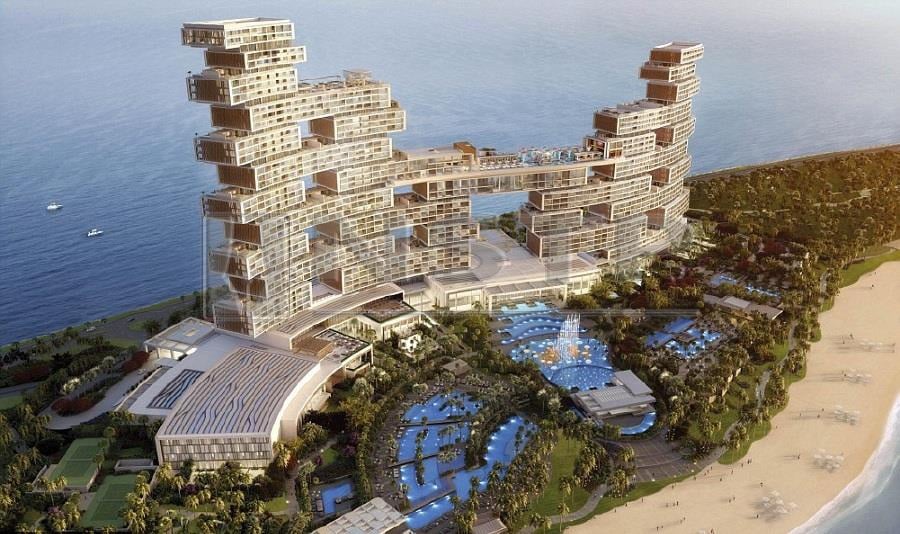Branded residences gaining popularity

(File pix) The Royal Atlantis Resort and Residences in Dubai. Theroyalatlantisresidences.com Photo
THE
first branded residence―The Sherry-Netherland Hotel ― opened its doors
in Manhattan, New York, in 1927. More than 90 years on, the segment has
expanded enormously to over 60 countries across the globe, including
Malaysia.
Branded properties in Malaysia include The Residences@The St. Regis Kuala Lumpur, Banyan Tree Signatures Pavilion, Four Seasons Private Residences and The Ritz-Carlton Residences.
Knight
Frank Malaysia head of residential sales and leasing and project
marketing, Kelvin Yip, said branded residences are becoming popular as
trophy assets that offer a high level of service,
facilities and quality.
This type of properties continues to attract affluent end-users and investors.
“More
branded residences are scheduled for completion by 2021 and
collectively they are expected to contribute more than 2,000 units to
the existing stock,” he said.
Notable
upcoming schemes include The RuMa Hotel & Residences, YOO8 serviced
by Kempinski at 8 Conlay and SO Sofitel Kuala Lumpur Residences by the
Accor Hotels Group.
According to Knight
Frank’s Branded Residences Report: 2019, branded residences in Kuala
Lumpur recorded a premium of 69 per cent against non-branded luxury
residences last year.
This was the second-highest price premium seen among Asian cities.
The
highest premium seen last year was in Bangkok, at 132 per cent above
non-branded luxury residences, followed by Kuala Lumpur at 69 per cent,
Manila at 36 per cent and Phuket at eight per cent.
The
Knight Frank report states that branded residences are attracting
significant premiums in Asian cities, with price differentials varying
by up to 132 per cent compared to generic luxury developments.
Price
premiums are driven primarily by location and can vary within the same
city, it noted. For suppliers of branded residences, motivators include
market differentiation, brand enhancement and year-round income, while
for buyers, they include service, amenities, security and investment
yield potential.
POSITIVE OUTLOOK
Knight Frank said growth in the branded residences sector will not be without potential pitfalls.
“There
is a danger that in democratising the concept of branded residences,
developers also risk devaluing it. The concept has always been
aspirational. Now hotel companies are offering brands at a four-star
level too.
“That risk may be unlikely
to stall developers, however, with industry commentators saying that it
is unlikely that we are going to move to a world where suddenly buyers
are no longer concerned with the offerings of branded residences,” the
firm said.
Knight Frank believes that
the market will undoubtedly get more competitive, and there will be a
few developers and brands squeezed out as a result.
“But that is unlikely to stop them from trying to capitalise on a market which still offers substantial benefits,” it said.
Knight
Frank global head of research Liam Bailey said: “The global branded
residences sector is growing exponentially. Until the 1980s, branded
residences were a scarce commodity. They can now be found in almost
every major city and holiday destination.
“Since a global residential benchmark was set at One Hyde Park, the London market has seen an increase in branded
residences
at the top end of the market. In Dubai, the emergence of branded
residences like The Royal Atlantis Resort and Residences mirrors the
city’s transition from a holiday destination to one in which to invest
in a more permanent home.
“The Asian
market for hotel branded residences has seen strong growth, particularly
in Thailand and Indonesia, with Asia now accounting for an estimated 30
per cent of 400 developments globally. This trend is set to continue.”
Knight
Frank Asia Pacific head of residential, Victoria Garret, said Asia’s
fast-growing, ultra-wealthy population is fueling demand for branded
residences.
She said these buyers
favour branded residences as they offer the convenience of high-quality
services, delivered by a trusted brand and with the potential for
capital appreciation.
“One example of
this is One Barangaroo, Crown Residences in Sydney. As Australia’s first
fully integrated, six-star hotel branded residences, the project has
received a very warm welcome from both domestic and offshore purchasers
since sales commenced. Like The Royal Atlantis, ongoing interest is
driven by a combination of its lifestyle offering, design and location,”
she Garret.
OVER 400 BRANDED RESIDENCES WORLDWIDE
Research
by Knight Frank shows that there are more than 400 branded residences
across the globe, the majority of which are hotel-branded.
The
number and types of operators entering the space is now expanding and
diversifying. Brands such as Versace, Armani and Porsche have all lent
their names to developments in recent years.
Marriott
International has, for example, Bvlgari-branded residences variation on
price differentials between different global locations and different
locations within cities.
Knight Frank
said it is seeing renewedinterest in the branded concept given the rapid
growth in global wealth witnessed since 2000.
Its
Wealth Report highlights that the global ultra-wealthy population
(owning US$50 milllion plus in net assets), grew 18 per cent in the five
years up to 2017 and is forecast to increase a further 40 per cent over
the next five.
“The market did not
really take off until mid 1980s when Four Seasons opened condos next to
their hotel in Boston. That really demonstrated the success of the
model,” says Chris Graham, an expert on the sector.
The Aman hotel group launched the concept in a resort setting in 1988, with Amanpuri in Phuket, Thailand.
“Marriott
alone has more than 60 branded residential projects in the pipeline,”
said Daniel von Barloewen, regional senior director for mixed-use
development for Europe at Marriott International.
This year and 2019 alone, Marriott plans to open 19 branded residential projects in nine countries.
No comments:
Post a Comment